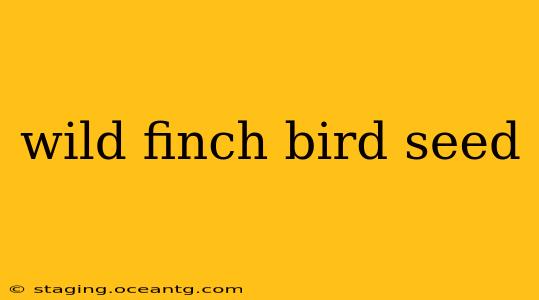Are you looking to attract a vibrant array of wild finches to your backyard? Providing the right food is key! This comprehensive guide will delve into the best types of wild finch bird seed, addressing common questions and offering expert tips for creating a thriving bird feeder haven. We'll cover everything from seed blends to supplementary feeding options, ensuring your feathered friends have a feast fit for royalty.
What kind of birdseed do wild finches like best?
Finches are relatively small birds with small, delicate beaks. They prefer seeds that are small enough to manage easily. Nyjer (thistle) seed is a top choice, highly favored by many finch species like goldfinches and house finches. Sunflower seeds (both black oil and striped) are also popular, offering a good source of energy. Smaller seeds like millet (white proso millet is particularly good) and canary seed are also attractive to finches.
What is the best mix of birdseed for finches?
There's no single "best" mix, as finch preferences can vary depending on the species and region. However, a good quality finch blend typically includes a mix of the seeds mentioned above: Nyjer seed, black oil sunflower seeds, white proso millet, and possibly some canary seed. Avoid mixes heavily loaded with fillers like cracked corn or wheat, as these are less appealing to finches and can attract unwanted birds like pigeons and starlings. Look for blends specifically marketed as "finch mix" or "small bird mix" for optimal results.
What seeds should I avoid feeding finches?
While many seeds are beneficial, some can be harmful or less desirable for finches. Avoid feeding seeds that are moldy, rancid, or coated in chemicals. Also, steer clear of mixes predominantly containing large seeds like cracked corn or peanuts, as these can be difficult for finches to handle and may discourage them from visiting your feeder. Breadcrumbs and other processed foods should also be avoided, offering little nutritional value.
What other foods can I feed wild finches?
Beyond seeds, finches appreciate a variety of supplementary foods, particularly during breeding season or harsh weather. Consider offering:
- Nyjer seed in specialized feeders: These feeders prevent larger birds from accessing the seed, ensuring your finches get their share.
- Suet: High in fat and energy, suet is a valuable winter food source. Choose suet formulated for birds, avoiding varieties containing salt or other harmful additives.
- Fruit: Small pieces of fresh fruit like apples or oranges can be a welcome treat. Avoid anything moldy or spoiled.
- Mealworms: Live or dried mealworms provide essential protein, especially beneficial for breeding birds.
How often should I refill my finch feeders?
The frequency of refilling depends on the number of birds visiting your feeders and the size of the feeders themselves. Regularly check your feeders, ideally daily, and refill as needed to ensure a consistent food supply. Avoid letting feeders become completely empty, as this can disrupt the birds' feeding habits and potentially drive them to seek food elsewhere.
Do finches prefer feeders with perches or hanging feeders?
Finches are comfortable using both types of feeders. Perch-style feeders provide a convenient resting spot while feeding, while hanging feeders often encourage more active foraging. The best option depends on the type of finches you're trying to attract and the available space in your yard. Offering a variety of feeder types can be beneficial.
By providing a diverse selection of high-quality seeds and supplementary foods, along with clean and readily accessible feeders, you can create a welcoming environment that attracts a thriving flock of wild finches to your backyard. Remember to observe your local birds and tailor your feeding strategy to their preferences. Happy birding!
